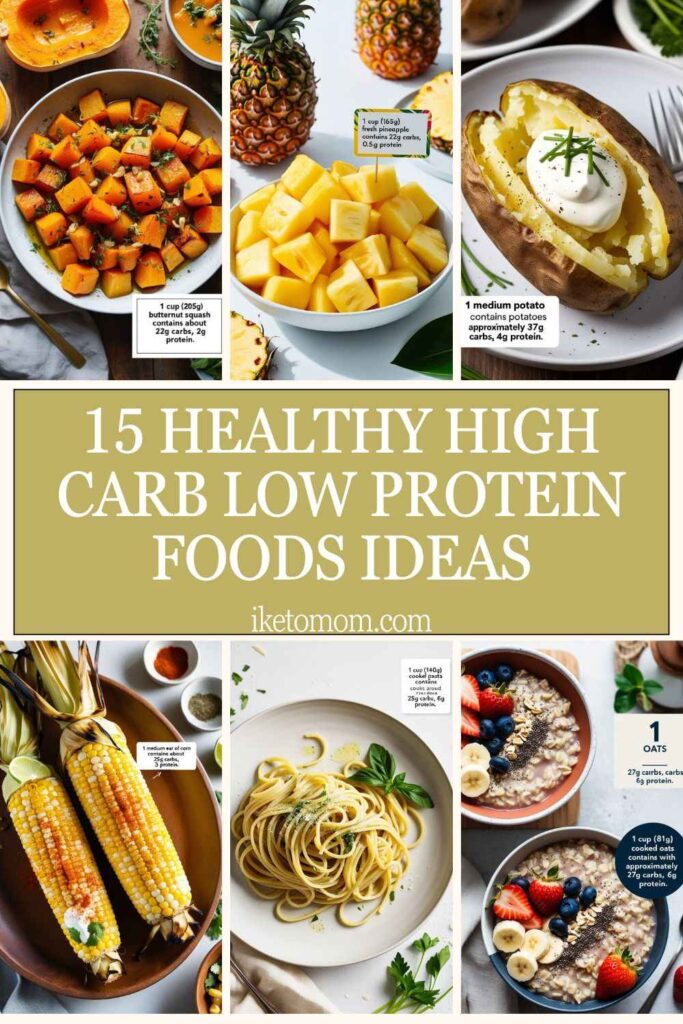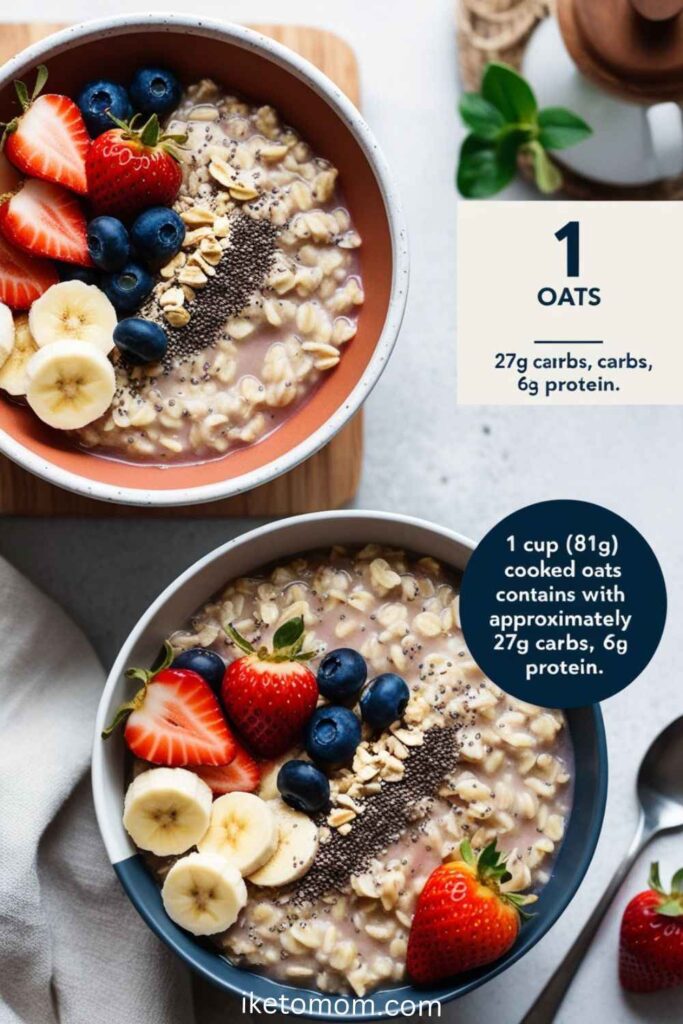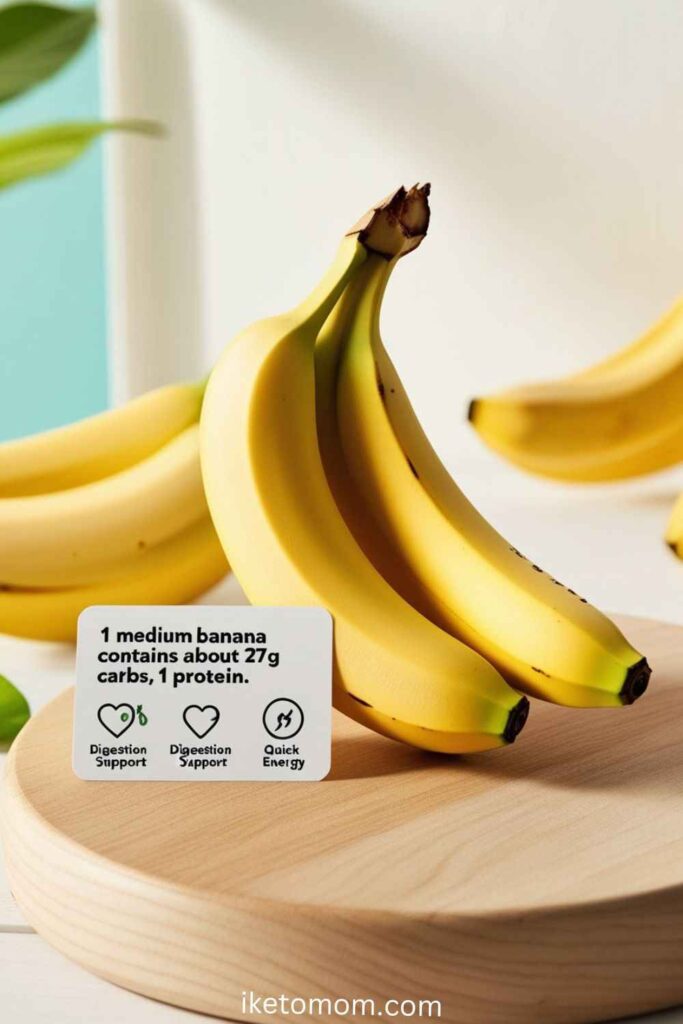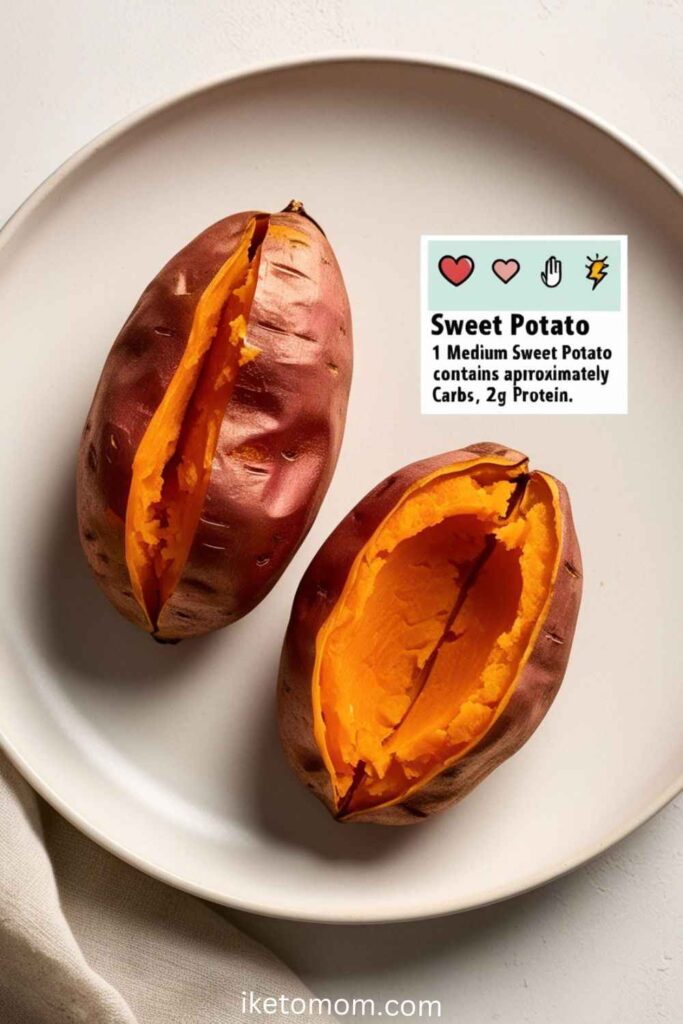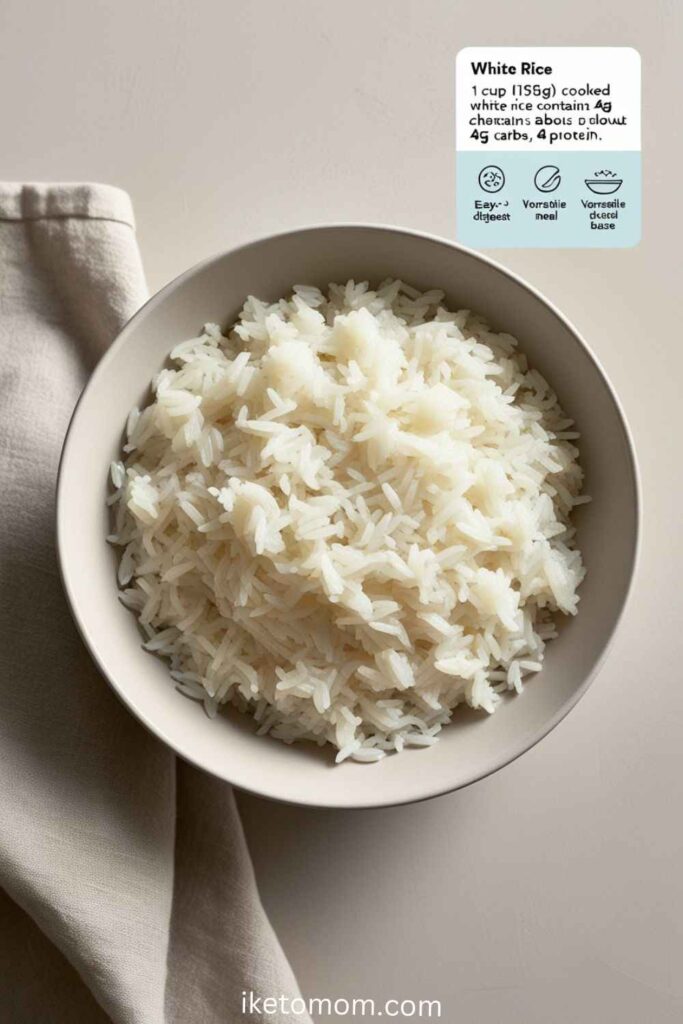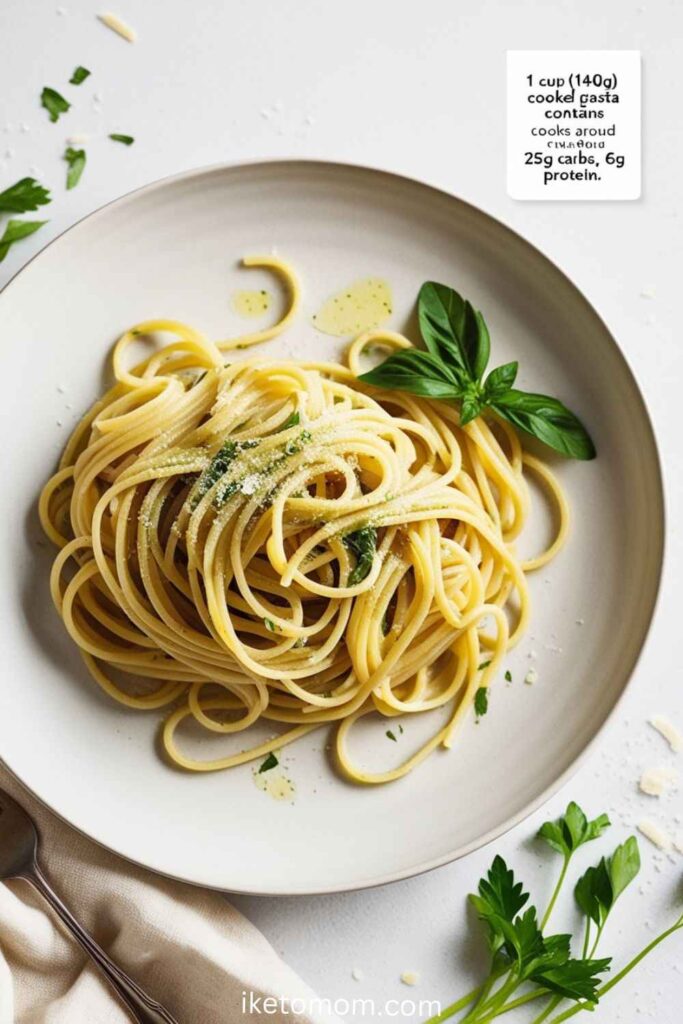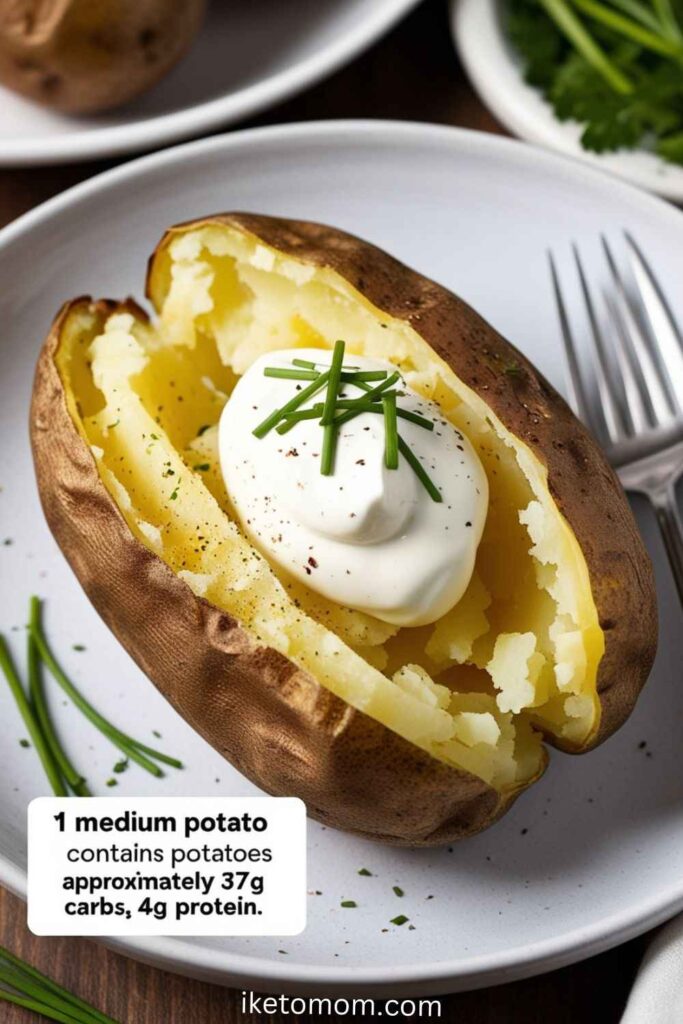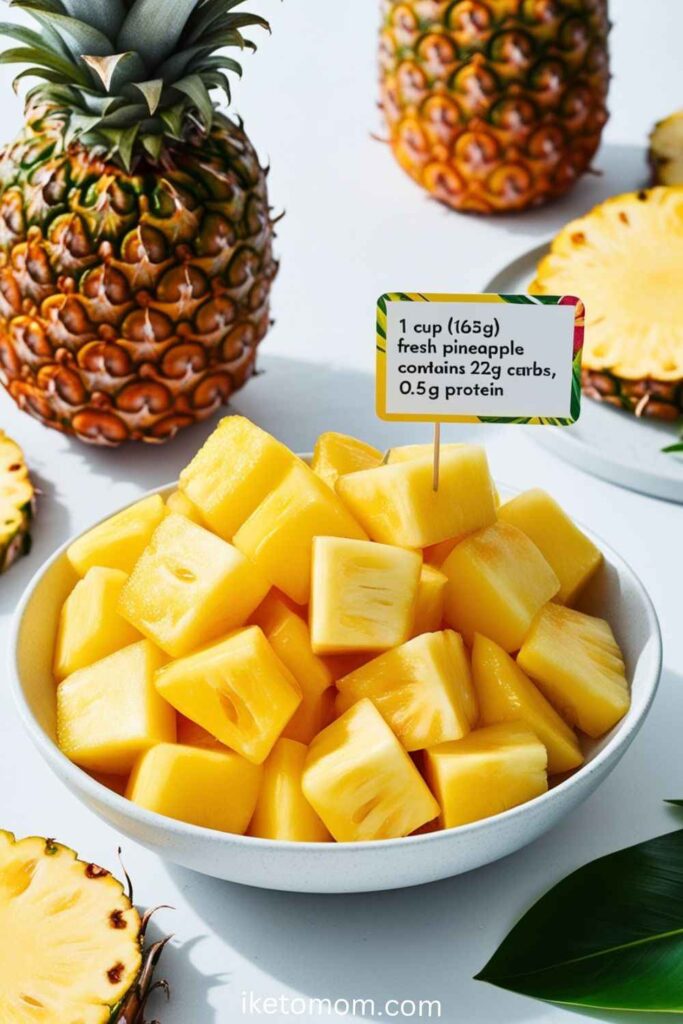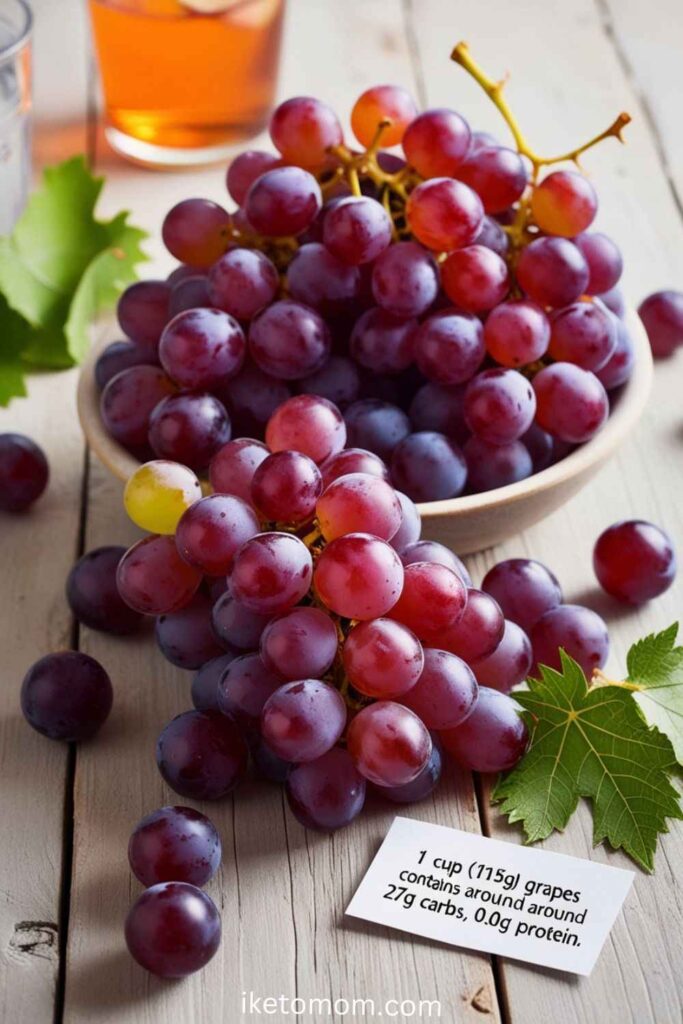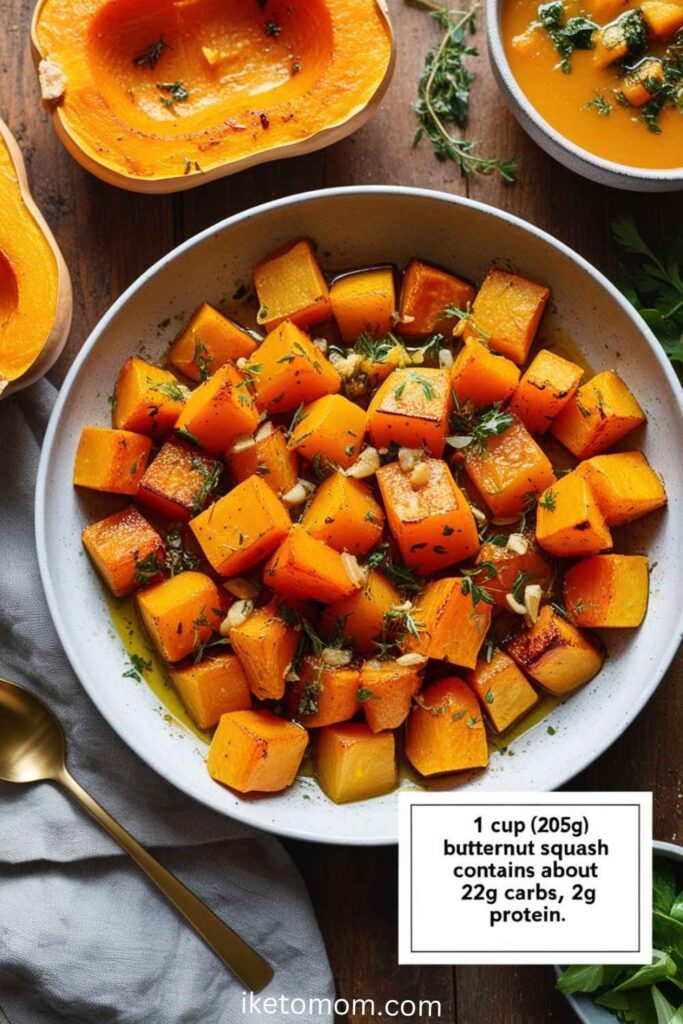High Carb Low Protein Foods Ideas are a key component of many balanced diets, particularly for those who need to fuel their bodies with energy without consuming excess protein. Carbohydrates are the body’s primary source of energy, supporting daily functions, physical activities, and brain health. When chosen wisely, high-carb foods can provide vital nutrients and aid in maintaining energy levels throughout the day.
These foods are typically rich in natural sugars, fiber, and essential vitamins and minerals, making them an excellent option for promoting overall well-being. It’s important to select healthy, nutrient-dense high-carb sources like fruits, vegetables, whole grains, and legumes to maximize the benefits. By avoiding refined sugars and highly processed carbs, individuals can ensure they are consuming the most wholesome forms of energy, which can help regulate blood sugar levels, support digestive health, and improve long-term health outcomes.
Choosing the right high-carb, low-protein foods helps maintain a balanced diet, especially for those with specific dietary needs such as athletes, individuals with kidney concerns, or those simply seeking to lower their protein intake. These foods play a crucial role in ensuring a nutrient-rich, energy-sustaining diet without overwhelming the body with excess protein or fat.
High Carb Low Protein Foods Ideas
1. Oats
High Carb Low Protein Foods Ideas: Oats are an excellent source of carbohydrates, making them a perfect addition to a high-carb, low-protein diet. They are naturally low in protein, providing a great balance of energy-boosting carbs without adding too much protein to your daily intake. Oats are rich in soluble fiber, particularly beta-glucan, which is beneficial for heart health and blood sugar regulation.
Nutrition Information: A typical serving of cooked oats (1 cup or 81g) contains approximately 27g of carbohydrates and 6g of protein. This makes oats a great option for those seeking a carb-heavy food that remains moderate in protein, making them versatile for various dietary needs.
Health Benefits:
- Energy Boost: Oats are a slow-digesting carbohydrate, which means they provide a steady source of energy throughout the day. They help stabilize blood sugar levels and prevent energy crashes, making them ideal for breakfast or pre-workout meals.
- Heart Health: The beta-glucan in oats has been shown to help lower cholesterol levels, contributing to improved heart health. Regular consumption can help reduce the risk of cardiovascular disease.
- Digestive Health: The high fiber content in oats promotes healthy digestion, helps maintain regular bowel movements, and can prevent constipation.
- Weight Management: Oats are known to increase satiety, helping you feel fuller for longer and potentially reducing overall calorie intake.
Potential Uses:
- Breakfast: Oats are a classic choice for breakfast. You can prepare them as oatmeal by cooking them with water or milk, and top them with fruits, nuts, or seeds for added flavor and nutrition.
- Smoothies: Oats can also be blended into smoothies for a creamy texture and a carb boost. Adding them to smoothies provides a filling base and helps keep you satisfied until your next meal.
- Baking: Oats can be used in baking for healthier alternatives, such as in granola bars, cookies, or muffins, where they provide structure while offering energy-boosting carbs.
Oats are not only nutritious but also incredibly versatile, making them a great addition to any meal plan. Whether you’re looking for a hearty breakfast, a smoothie ingredient, or a healthy snack, oats are a go-to food that supports both your energy levels and overall health.
2. Bananas
High Carb Low Protein Foods Ideas: Bananas are an excellent source of natural sugars and carbohydrates, making them an ideal option for those looking for a high-carb, low-protein food. They are rich in simple sugars like glucose, fructose, and sucrose, which provide the body with a quick and easily accessible energy boost.
Nutrition Information: A medium-sized banana (approximately 118g) contains about 27g of carbohydrates and 1g of protein. This makes bananas a great addition to a high-carb, low-protein diet, offering substantial carbs with minimal protein.
Health Benefits:
- Quick Energy Boost: Bananas are rich in natural sugars, making them a perfect quick energy source. Whether you’re preparing for a workout or need a mid-day pick-me-up, the carbohydrates in bananas can provide an immediate boost to your energy levels.
- Digestive Health: Bananas are a good source of fiber, particularly pectin, which aids in digestion. The high fiber content helps regulate bowel movements and can prevent constipation, making bananas an excellent food for gut health.
- Heart Health: Bananas are also a good source of potassium, an essential mineral that helps regulate blood pressure and support heart health. Potassium plays a key role in maintaining proper muscle and nerve function.
- Mood and Mental Health: Bananas contain vitamin B6, which is important for the production of neurotransmitters that help regulate mood and reduce feelings of anxiety or depression.
Potential Uses:
- Snacking: Bananas are a convenient, portable snack. They’re easy to take on-the-go and require no preparation, making them a perfect option for busy days or travel.
- Smoothies: Bananas add natural sweetness and creaminess to smoothies. They pair well with other fruits, yogurt, and even oats, making them a versatile and nutritious smoothie ingredient.
- Breakfast: Bananas can be sliced onto cereal, oatmeal, or yogurt for a quick, nutritious breakfast. Their natural sweetness eliminates the need for added sugars.
- Baking: Ripe bananas can be used in baking to add moisture and sweetness to healthy baked goods like banana bread, muffins, and pancakes.
Bananas are not only delicious and easy to enjoy but also offer a wide range of health benefits. Their high carb content, combined with their digestive and heart-healthy properties, makes them an ideal choice for anyone looking to incorporate more natural energy into their diet.
3. Sweet Potatoes
High Carb Low Protein Foods Ideas: Sweet potatoes are an excellent source of complex carbohydrates, making them a great option for those seeking high-carb, low-protein foods. These nutrient-dense tubers provide a slow-release form of energy, helping to keep blood sugar levels stable throughout the day.
Nutrition Information: A medium-sized sweet potato (about 130g) contains approximately 23g of carbohydrates and 2g of protein. This makes sweet potatoes an ideal addition to a diet that focuses on carbs while keeping protein intake at a moderate level.
Health Benefits:
- Heart Health: Sweet potatoes are rich in potassium, which helps regulate blood pressure and supports cardiovascular health. Their high fiber content also promotes healthy cholesterol levels and improves overall heart function.
- Skin Health: Loaded with beta-carotene, which the body converts into vitamin A, sweet potatoes help maintain healthy skin by supporting cell regeneration and protecting against UV damage. Vitamin A also promotes wound healing and reduces signs of aging.
- Energy Levels: The complex carbs in sweet potatoes provide a slow and steady energy release, making them a perfect option for maintaining energy levels throughout the day. They are also rich in B vitamins, which help convert food into energy.
- Digestive Health: The high fiber content in sweet potatoes aids digestion by promoting healthy bowel movements and gut health. Fiber also helps manage weight by making you feel full for longer periods.
Potential Uses:
- Roasted or Baked: Sweet potatoes can be roasted or baked as a side dish. You can simply season them with olive oil, salt, and herbs for a flavorful and nutritious meal.
- Mashed: A classic way to prepare sweet potatoes is by mashing them. Add a bit of cinnamon, nutmeg, or honey for a naturally sweet and savory dish.
- Sweet Potato Fries: Sweet potato fries are a healthy alternative to regular fries, offering a crispy and satisfying snack or side dish.
- Soups and Stews: Sweet potatoes can be added to soups and stews, providing both flavor and nutritional value to the dish. They pair well with beans, lentils, and other vegetables.
- Smoothies: Roasted sweet potatoes can be blended into smoothies for added creaminess and a natural energy boost.
Sweet potatoes are not only delicious but also incredibly versatile. With their rich carbohydrate content, along with heart-healthy and skin-boosting benefits, they make an excellent choice for anyone looking to incorporate more nutritious, high-carb foods into their diet.
4. White Rice
High Carb Low Protein Foods Ideas: White rice is a versatile and popular source of carbohydrates, making it a staple in many cuisines around the world. It is rich in carbs and low in protein, providing a quick source of energy that is easily digested. While it may not contain as many nutrients as its whole-grain counterparts, white rice remains a go-to option for those needing a simple, high-carb food.
Nutrition Information: One cup (158g) of cooked white rice contains approximately 45g of carbohydrates and 4g of protein. This makes it an ideal base for meals, especially for those focusing on high-carb, low-protein options.
Health Benefits:
- Easily Digestible: White rice is low in fiber, which makes it easy to digest and gentle on the stomach. It’s a great option for people with digestive issues or those recovering from illness.
- Quick Energy Source: The high carbohydrate content in white rice provides a rapid energy boost, making it an excellent choice before or after physical activity to replenish glycogen stores.
- Blood Sugar Regulation: While it has a high glycemic index, pairing white rice with protein or fiber-rich foods can help moderate its impact on blood sugar levels. It’s a convenient option for balanced meals when combined with vegetables, lean proteins, or legumes.
- Versatile Meal Base: White rice pairs well with a variety of ingredients, making it ideal for a wide range of dishes. It can be used as a side dish, in stir-fries, curries, or as part of grain bowls.
Potential Uses:
- Side Dish: White rice makes a perfect side dish to complement proteins and vegetables in any meal, from curries to grilled meats.
- Stir-fries: Add cooked white rice to stir-fries with a variety of vegetables and seasonings for a quick, satisfying meal.
- Rice Bowls: Top white rice with a mix of your favorite ingredients, such as beans, grilled vegetables, or avocado, to create a healthy and balanced rice bowl.
- Sushi: White rice is a key ingredient in sushi rolls, providing a neutral base that balances the flavors of fish and vegetables.
- Rice Puddings and Desserts: White rice can also be used in desserts, such as rice pudding, offering a creamy texture and mild flavor.
White rice is not only quick and easy to prepare, but its versatility makes it an essential ingredient for countless meals. Whether you’re looking for an easy meal base or a source of fast energy, white rice remains a classic choice in many diets.
5. Pasta
High Carb Low Protein Foods Ideas: Pasta made from refined flour is a popular and versatile source of high carbohydrates, making it an excellent option for those seeking high-carb, low-protein foods. It provides a quick and satisfying energy boost, while still being relatively low in protein compared to other sources of carbs.
Nutrition Information: One cup (140g) of cooked pasta contains approximately 25g of carbohydrates and 6g of protein. While pasta offers a moderate amount of protein, its carb content makes it a great choice for those focusing on high-carbohydrate meals.
Health Benefits:
- Quick Energy Source: The carbohydrates in pasta are a fast-digesting source of energy. They can help replenish glycogen stores after physical activity and provide the body with energy throughout the day.
- Versatility: Pasta can be paired with a wide range of ingredients, making it an adaptable dish for various dietary needs. While it’s low in protein, pairing it with vegetables, light sauces, or legumes can create a balanced, nutrient-dense meal.
- Easily Digestible: Pasta made from refined flour is easy to digest, making it a good option for those with sensitive stomachs or digestive concerns.
- Satisfying and Filling: The combination of carbs and fiber in pasta makes it a filling food, keeping you satisfied for longer periods and helping to curb overeating.
Potential Uses:
- Vegetable-Based Sauces: Pasta pairs perfectly with vegetable-based sauces, such as marinara, pesto, or a creamy cauliflower sauce, making for a light yet satisfying meal.
- Light Dressings: For a lighter dish, pasta can be topped with olive oil, lemon, herbs, or light vinaigrettes for a fresh and simple meal.
- Cold Pasta Salads: Pasta can be used in cold pasta salads, mixed with vegetables, beans, or light protein sources like chicken or tofu, for a nutritious and refreshing dish.
- Stir-Fries: Combine cooked pasta with stir-fried vegetables, soy sauce, and spices for a quick and easy meal with a delightful flavor.
- Baked Pasta Dishes: Pasta can be baked into dishes like lasagna or baked ziti, providing a hearty and satisfying meal.
Pasta is not only a great source of high-quality carbs but also a versatile base for a variety of meals. Whether enjoyed with a light sauce, incorporated into a salad, or baked into a hearty casserole, pasta remains a favorite choice for creating filling, balanced meals.
6. Corn
High Carb Low Protein Foods Ideas: Corn is a highly nutritious source of carbohydrates that provides a satisfying energy boost without significant protein content. As a whole grain, it’s packed with complex carbs that release energy slowly, making it a great option for maintaining steady energy levels throughout the day.
Nutrition Information: One medium ear of corn contains about 25g of carbohydrates and 3g of protein. While it contains a small amount of protein, it is primarily a carbohydrate-rich food that makes it a perfect fit for a high-carb, low-protein diet.
Health Benefits:
- Digestive Health: Corn is a good source of fiber, which aids in digestion and promotes regular bowel movements. The fiber in corn can also help prevent constipation and maintain overall gut health.
- Energy Boost: The high carbohydrate content in corn provides a steady and long-lasting source of energy, making it ideal for fueling physical activity or providing a quick energy boost.
- Rich in Nutrients: Corn contains important vitamins and minerals, such as vitamin C, B vitamins, and magnesium, which are essential for maintaining healthy bodily functions, including metabolism and immune health.
- Antioxidant Properties: Corn also contains antioxidants, such as carotenoids and flavonoids, that help combat oxidative stress and support overall health.
Potential Uses:
- Grilled or Roasted: A classic way to enjoy corn is by grilling or roasting the whole ear. This method brings out the natural sweetness and adds a smoky flavor.
- Corn on the Cob: Serve corn on the cob as a simple side dish with butter and seasonings or with a sprinkle of chili powder and lime for added zest.
- Salads: Corn can be added to fresh salads for extra crunch and flavor. It pairs well with other vegetables, beans, or grains like quinoa.
- Soups and Stews: Corn can be included in soups and stews to add texture and sweetness. It blends well with beans, potatoes, and other hearty ingredients.
- Salsas and Sides: Mix corn with tomatoes, onions, and cilantro to create a flavorful salsa or as a side dish that complements grilled meats or fish.
Corn is a versatile and nutritious addition to a high-carb diet. Whether enjoyed as a simple side, incorporated into salads, or added to soups and stews, it provides energy, supports digestion, and enhances a variety of dishes.
7. Potatoes
High Carb Low Protein Foods Ideas: Potatoes are a widely consumed food, rich in carbohydrates and low in protein. They can be enjoyed in many forms, including baked, mashed, or roasted, and serve as an excellent source of energy. Potatoes are known for their versatility and can easily be incorporated into a variety of dishes.
Nutrition Information: One medium-sized potato (about 150g) contains approximately 37g of carbohydrates and 4g of protein. This makes potatoes a high-carb option with minimal protein, perfect for those seeking a carb-rich, low-protein food.
Health Benefits:
- Replenishing Glycogen: Potatoes are an excellent choice for replenishing glycogen stores after exercise. The high carb content provides a quick source of energy, making them ideal for post-workout recovery.
- Rich in Vitamins: Potatoes are packed with essential vitamins, particularly vitamin C and B6, which are vital for immune function, skin health, and maintaining energy levels. They also contain antioxidants that help fight inflammation and support overall health.
- Digestive Health: The fiber content in potatoes supports digestive health by promoting regular bowel movements and aiding in gut health. Consuming potatoes with their skins on provides additional fiber, which further supports digestion.
- Heart Health: Potatoes contain potassium, an important mineral that helps maintain healthy blood pressure and supports proper heart function.
Potential Uses:
- Baked Potatoes: Enjoy a baked potato as a simple side dish, topped with a variety of seasonings, herbs, or a dollop of sour cream for added flavor.
- Mashed Potatoes: Mashed potatoes are a classic comfort food, perfect as a side dish. You can prepare them with butter, garlic, or olive oil for extra taste and nutrition.
- Roasted Potatoes: Roasting potatoes with olive oil and herbs creates a crispy, flavorful dish that pairs well with meats or vegetables.
- Potato Salad: Cold potato salad is a popular dish, often mixed with vegetables, herbs, and a light dressing for a refreshing and satisfying meal.
- Soups and Stews: Potatoes are commonly added to soups and stews, providing bulk and texture while contributing to a hearty, warming meal.
Potatoes are a staple food with numerous health benefits. Their high carb content, combined with essential vitamins and their ability to replenish glycogen, make them an ideal choice for a nutritious, energy-boosting meal.
8. Pineapple
High Carb Low Protein Foods Ideas: Pineapple is a tropical fruit that is high in natural sugars and carbohydrates, making it a delicious and refreshing option for those seeking high-carb, low-protein foods. It provides a natural sweetness while also offering a good amount of water, making it an excellent option for hydration.
Nutrition Information: One cup (165g) of fresh pineapple contains approximately 22g of carbohydrates and 0.5g of protein. This makes it a low-protein fruit with a high carbohydrate content, perfect for a quick energy boost.
Health Benefits:
- Hydration: Pineapple is made up of about 85% water, making it a fantastic option for staying hydrated. This high water content can help replenish fluids after exercise or during hot weather.
- Digestive Health: Pineapple contains bromelain, an enzyme that aids in digestion by breaking down proteins and improving overall digestive health. It can help reduce bloating and enhance nutrient absorption.
- Rich in Vitamins: Pineapple is an excellent source of vitamin C, an essential antioxidant that helps boost immunity, promote healthy skin, and protect against oxidative stress.
- Anti-inflammatory: The bromelain enzyme in pineapple also has anti-inflammatory properties, making it helpful in reducing swelling and inflammation in the body.
- Energy Boost: The natural sugars in pineapple provide a quick energy boost, making it a great option for a post-workout snack or a refreshing treat throughout the day.
Potential Uses:
- Fresh Snack: Pineapple is delicious eaten fresh, either on its own or as part of a fruit salad.
- Smoothies: Add fresh pineapple to smoothies for a tropical twist.
9. Grapes
High Carb Low Protein Foods Ideas: Grapes are naturally sweet, making them a satisfying and healthy option for those seeking high-carb, low-protein foods. Packed with carbohydrates, they provide a quick energy boost and are rich in natural sugars, making them a perfect snack for a mid-day pick-me-up or a sweet addition to any meal.
Nutrition Information: One cup (151g) of grapes contains approximately 27g of carbohydrates and 0.6g of protein. This makes grapes a low-protein fruit, ideal for those focusing on increasing their carbohydrate intake.
Health Benefits:
- Rich in Antioxidants: Grapes are a great source of antioxidants, including flavonoids and resveratrol, which help protect the body from oxidative stress and promote heart health. These antioxidants can also support healthy aging and reduce the risk of chronic diseases.
- Natural Energy Boost: The natural sugars in grapes provide an immediate and sustained source of energy, making them an excellent snack for refueling after exercise or during a busy day.
- Hydration: With a high water content, grapes help keep you hydrated, supporting overall health and well-being.
- Heart Health: The antioxidants in grapes, particularly resveratrol, have been shown to support cardiovascular health by improving blood flow, reducing inflammation, and lowering the risk of heart disease.
- Digestive Health: Grapes contain fiber, which helps support healthy digestion and regular bowel movements, making them beneficial for gut health.
Potential Uses:
- Fresh Snack: Grapes are perfect for eating fresh as a quick snack, either on their own or paired with other fruits for a refreshing fruit salad.
- Smoothies: Grapes can be blended into smoothies, adding natural sweetness and a burst of flavor. They pair well with other fruits like bananas, berries, or citrus.
- Frozen Grapes: For a cool treat, freeze grapes and enjoy them as a refreshing snack on a hot day.
- Salads: Add grapes to salads for a touch of sweetness that balances well with savory ingredients like greens, cheese, or nuts.
- Grape Juice: Fresh grapes can be juiced for a hydrating and antioxidant-rich drink.
Grapes are a delicious and versatile fruit, providing a natural source of sugar and antioxidants that support health and energy levels. Whether eaten fresh, frozen, or incorporated into dishes, grapes are an easy and nutritious choice for a high-carb, low-protein snack.
10. Butternut Squash
High Carb Low Protein Foods Ideas: Butternut squash is a nutrient-dense vegetable that is rich in carbohydrates and low in protein. It’s an excellent choice for high-carb, low-protein diets and can be incorporated into various dishes, from soups and stews to roasted vegetables. Its naturally sweet flavor makes it a versatile ingredient for savory and even some sweet recipes.
Nutrition Information: One cup (205g) of butternut squash contains about 22g of carbohydrates and 2g of protein. Though it contains a small amount of protein, its primary benefit comes from its high carbohydrate content, making it ideal for providing sustained energy.
Health Benefits:
- Rich in Fiber: Butternut squash is a great source of dietary fiber, which helps support digestive health by promoting regular bowel movements and improving gut health. The fiber also aids in controlling blood sugar levels by slowing digestion.
- Packed with Beta-Carotene: Butternut squash is an excellent source of beta-carotene, an antioxidant that the body converts into vitamin A. Beta-carotene supports vision, immune function, and skin health.
- Heart Health: The high fiber and potassium content of butternut squash help support healthy blood pressure levels and promote heart health by reducing the risk of heart disease.
- Anti-inflammatory Properties: The antioxidants in butternut squash, particularly beta-carotene and other carotenoids, have anti-inflammatory effects that help reduce inflammation and protect against chronic diseases.
Potential Uses:
- Roasted Dishes: Roasting butternut squash with olive oil, garlic, and herbs creates a sweet, savory side dish that pairs well with other vegetables, grains, or proteins.
- Soups and Stews: Butternut squash is a key ingredient in many soups and stews, providing a creamy texture when pureed and adding natural sweetness to the broth.
- Mash or Puree: Mashed or pureed butternut squash is a great substitute for mashed potatoes or can be added to baked goods for extra moisture and flavor.
- Salads: Roasted butternut squash can be added to salads for a sweet and hearty component. Pair it with greens, nuts, and a tangy dressing for a balanced meal.
- Baked Goods: Butternut squash can be incorporated into baking recipes, such as muffins or breads, providing moisture and a natural sweetness.
Butternut squash is a versatile and healthy vegetable that can be enjoyed in various forms. Its high carbohydrate content, along with its rich fiber and beta-carotene, makes it an excellent choice for nourishing, energy-boosting meals.
FAQ
1. What are high-carb, low-protein foods?
High-carb, low-protein foods are foods that are rich in carbohydrates but contain little to no protein. These foods are typically plant-based and provide energy in the form of carbohydrates without significantly contributing to protein intake. Examples include fruits, vegetables, grains, and starchy foods like potatoes, rice, and pasta.
2. Why would someone choose a high-carb, low-protein diet?
A high-carb, low-protein diet can be beneficial for individuals who need to increase their carbohydrate intake for energy, such as athletes or those undergoing intense physical activity. It can also support digestion, help manage blood sugar levels, and offer nutrient-rich foods that provide essential vitamins and minerals without adding excessive protein.
3. Are high-carb, low-protein foods healthy?
Yes, many high-carb, low-protein foods are healthy when consumed in balanced amounts. Foods like fruits, vegetables, whole grains, and legumes are packed with essential nutrients such as fiber, antioxidants, vitamins, and minerals. The key is to choose nutrient-dense, whole foods and avoid overly processed, high-sugar options.
4. Can I include high-carb, low-protein foods in a weight loss diet?
Yes, high-carb, low-protein foods can be included in a weight loss diet if consumed in moderation. When focusing on weight loss, it’s important to choose whole, nutrient-dense carbs like fruits, vegetables, and whole grains while controlling portion sizes. These foods provide essential nutrients, help maintain energy levels, and support digestion without contributing to excessive calorie intake.

I’m Priscilla Swahn, a registered dietitian with a master’s degree in nutritional sciences. With over a decade of experience in holistic nutrition, I specialize in creating delicious keto recipes to help you enjoy a healthy lifestyle. On iKetoMom, you’ll find a variety of recipes for every meal—hearty breakfasts, satisfying lunches, mouthwatering dinners, indulgent desserts, and refreshing drinks. My recipes make keto living easy and enjoyable for the whole family. Featured in EatingWell and MindBodyGreen, I also collaborate with health centers and corporate companies to share my expertise. Join me and discover the joy of keto cooking!

